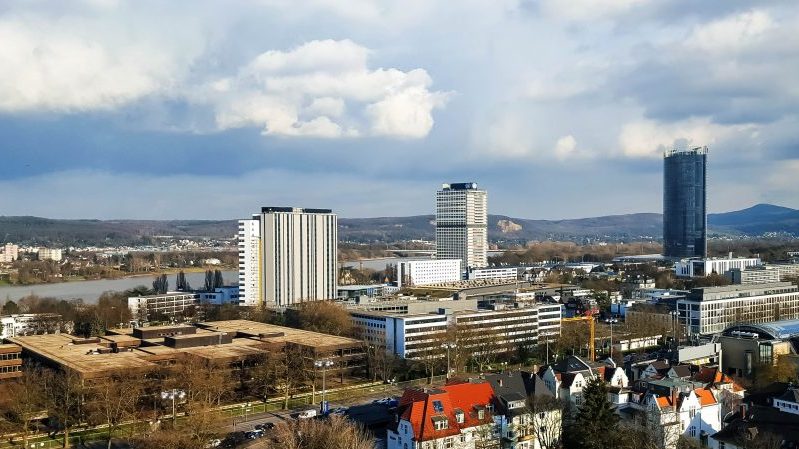There were fears of an upset at the past fortnight’s climate talks in Bonn, the first test of Donald Trump’s approach to international climate cooperation.
In the event, the US delegation had no mandate to either help or hinder proceedings, with their president deferring that critical decision on participation in the Paris Agreement. I guess he had other things on his mind.
Fiji prime minister Frank Bainimarama, taking over presidency of the UN process, closed with a call for solidarity – noting that Miami and New York are in the path of rising seas, just as Pacific islands are.
Delegates at the talks maintained that US politics won’t hold back implementation of the Paris climate deal. By their next meeting, that will be put to a clearer test, wrote Karl Mathiesen.
As questions about his Russia ties get more insistent at home, Trump is setting off on his first foreign tour. Crucially, the G7 summit 26-27 May is a chance for fellow leaders to impress on him the consequences of backsliding.
Vive la révolution verte
France’s new president Emmanuel Macron, for one, has promised to defend “what was made in Paris”. His cabinet picks bode well for domestic action, too.
This week prime minister Edouard Philippe said France would pursue “rapid, massive and visible” renewable energy development. And climate advocates welcomed the appointment of well-known campaigner Nicolas Hulot as environment minister.
Number crunching
For the scale of change needed to meet the Paris goals, though, the world is looking to Asia’s emerging giants.
Here, Climate Action Tracker found signs China and India are outperforming their climate targets, as coal development stalls.
If those trends continue, analysts say greenhouse gas savings in the east will more than outweigh a predicted increase in US emissions under Trump.
Green expansion
China’s Xi Jinping also wove climate protection into the narrative of his first ever “belt and road” summit on overseas investment.
He proposed an “international coalition for green development” as part of his flagship foreign policy programme, which targets key trading corridors.
The proof will be in the pipeline of coal plants in the likes of Turkey, Pakistan and Indonesia. China emerged as the main investor in such projects as western institutions tightened their environmental guidelines. Is Beijing too about to cut back?
Zombie coal
Even in emerging markets, with huge latent demand for electricity, investment in coal power is a risky business. India faces a “gigantic stranded asset problem”, according to former top power official Ajay Shankar, as a coal power boom turns to bust.
Darryl D’Monte reported on one plant in Maharashtra state that is getting paid $150 million a year to sit idle. Consumers are footing the bill for poor planning and generously designed contracts.
In a sign of the times, the plant’s developer Rattan India has switched to solar for a major site in the Punjab.
Climate conversations
Pacific islands dominated our comment pages this week.
Solomon Islands ambassador Moses Kouni Mose flagged up a small but growing “high ambition coalition” for climate action in the laggardly shipping sector.
Ocean acidification is global warming’s forgotten crisis, warned Nauru’s Marlene Moses, chair of Pacific small island developing states at the UN.
Geography professor Patrick Nunn argued secular climate adaptation projects were missing their mark in pious Pacific communities.
And Julie-Anne Richards suggested ways the Fijian presidency could broker finance for the victims of climate disasters – one of which is to tax shipping emissions, circling back to Mose’s mission.
Africa spat
In an interview with Climate Home on the sidelines of Bonn talks, Ségolène Royal defended herself against allegations of hijacking the Africa Renewable Energy Initiative.
France’s former environment minister revealed that Malian diplomat Seyni Nafo is in line to take over the secretariat from his fellow countryman Youba Sokona, who resigned in protest at EU interference.
NGOs cautiously welcomed Nafo’s appointment, but reiterated calls for donor countries to back off and respect African ownership of the scheme.
Shell shock
A leading Dutch business school allowed oil major Shell to influence its curricula and student selection, under a sponsorship deal agreed in 2012.
The revelations about the Rotterdam School of Management prompted lawmakers to schedule a parliamentary debate, reported Arthur Neslen.
While the university denied Shell selected course content, campaigners said the deal compromised academic independence and facilitated climate change.
Rice spike
Bangladesh is suffering a jump in food costs after flash floods wiped out 400,000 hectares of rice paddy, Abu Siddique reported from Dhaka.
A kilogram of coarse rice costs 58% more than this time last year and the government is procuring extra supplies from abroad.
The problem was unseasonably heavy rainfall, which experts said was consistent with predictions of climate change models.
